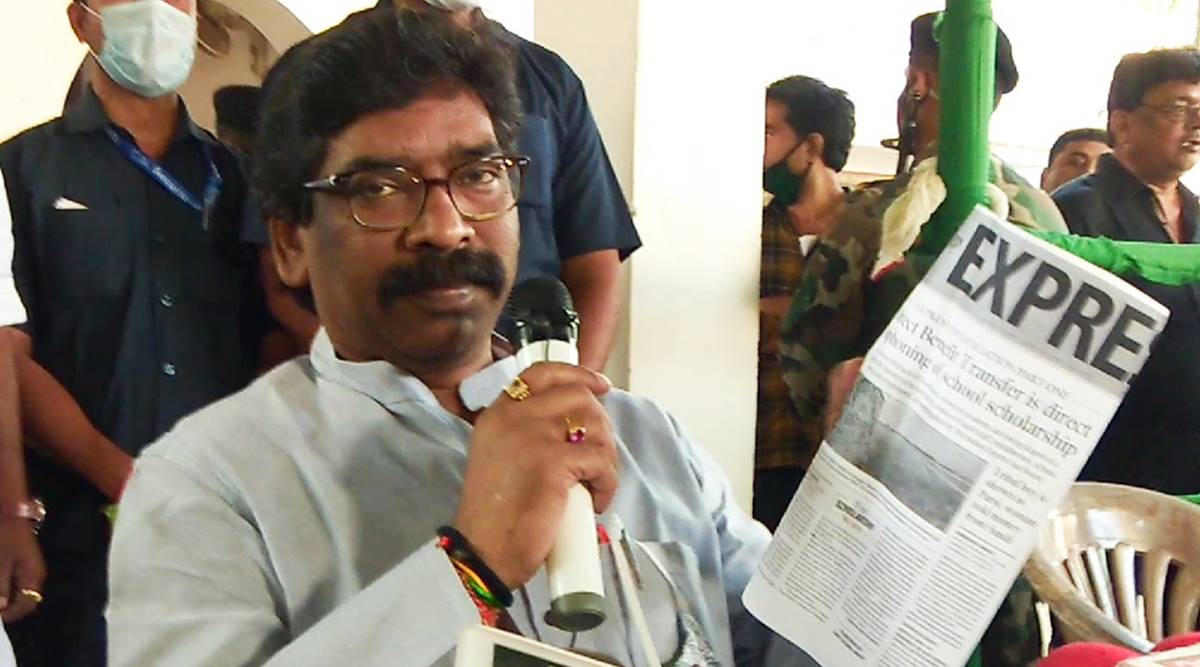 The Hemant Soren government will announce various schemes on December 29, when it completes one year. (File)
The Hemant Soren government will announce various schemes on December 29, when it completes one year. (File)Loan waiver for 9.07 lakh Jharkhand farmers at a cost of Rs 2000 crore; finding ‘suitable and experienced’ manufactures for anganwadis’ Take Home Ration; shifting from land acquisition to land pooling for infrastructure development in urban areas; and replacing Prime Minister crop insurance scheme with its own – these are some of the key policy decisions approved by the Jharkhand state cabinet Wednesday.
The Cabinet was called for approvals of various government plans that will showcase its achievements, and to announce various schemes on December 29, when it completes one year.
As per the data, Jharkhand has 12.93 lakh farmers who have due farm loans amounting to Rs 5,800 crore. The Agriculture Department has identified 9.07 lakh farmers whose loan will be waived with a capping of Rs 50,000. “As many as 7.83 lakh farmers’ full farm loan will be waived, and the remaining farmers will get a relief of Rs 50,000. The expenditure on this will be Rs 2,000 crore,” said Agriculture Minister Badal Patralekh after the cabinet meeting.
As per the minutes of the meeting of the agriculture department and the State Level Bankers Committee, in the first phase of implementation, three ‘major banks’—State Bank of India, Bank of India, Jharkhand Grameen Bank—which have 77% of the total KCC loans, will get the work done. “All three banks will collect forms manually for the first phase. Money for 10, 500 ‘Standard KCC’ crop loan accounts, or 10, 500 farmers, will be given by the government on December 29,” said a source.
“Banks to ensure to collect the certified copies of Aadhar cards, Ration cards of the farmers and retain them with their branches for further uploading on web portal or requirement by the competent authority,” the minutes of the meeting said. The banks will charge farmers Re 1 for the service,
For Take Home Rations (THR) for anganwadis under the Centre’s Integrated Child Development Scheme, the Jharkhand government gave the cabinet nod for contracting ‘able and experienced manufacturers’. The manufacturer will give ‘Micronutrient Fortified and Energy Food’ to state’s 38,432 Angawadi Centres, which gives food to three-to-six-months-old children, pregnant mothers, and six to 72 -month-old malnourished children. “It will be done through a tender process with transparency. THR will have nutritional sweet and salt daliya,” said Cabinet Secretary Ajoy Kumar during a press briefing.
Under the previous Raghubar Das government, private companies’ involvement in supply of THR had been cancelled, and the job was given to Jharkhand State Livelihood Promotion Society under the Rural Development Department. The Society later trained SHGs for this purpose. A source in the government said: “The supply of THR should not be contracted out, the government should do it. Earlier, under private hands, stale or rotten food was being given to people. After backlash, the Raghubar Das government gave it to SHGs. It is sad that this government is reversing the same.”
The cabinet also approved the replacement of PM Kisan Bima Yojna with the state’s own Fasal Rahat Yojna, earmarking Rs 100 crore for this. Cabinet Secretary Ajoy Kumar said: “From now on, no insurance company will roped in for this scheme. The state will give money to farmers directly in case crop damage. It was found that in 2016, the government paid Rs 153 crore in premium to insurance companies, whereas the farmers received only Rs 29 crore in compensation. In 2017, the premium paid was Rs 114 crore while compensation stood at Rs 36 crore. In 2018, the govt paid Rs 225 crore as premium and Rs 13 crore as compensation.”
The cabinet also approved an amendment to the Jharkhand Regional Development Authority under the Urban Development Department. The cabinet decided that from now on, the government will not acquire any land and will instead have a land pooling policy. “The land pooling policy is based on the Telangana model… after land pooling, a part of developed land will be returned proportionately to the original owners,” a source said.
The cabinet also approved abroad scholarship scheme for 10 ST students per year, and a workplace policy on TB and its comorbidities — including occupational lung disease — the details of which are yet to be released.